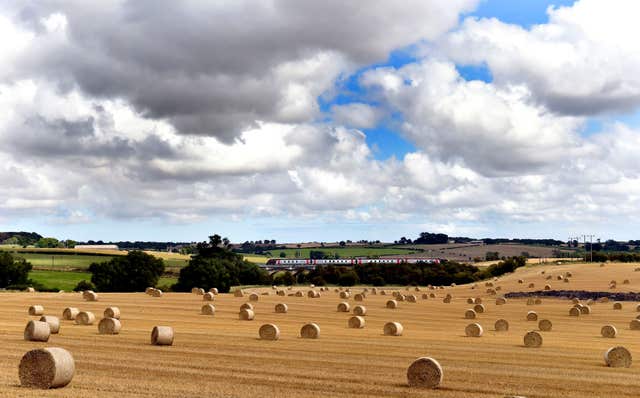
Many voters in Britain’s most rural constituencies are worried about climate change and support net zero and local renewables, polling suggests.
A survey for the Energy and Climate Intelligence Unit think tank (ECIU) backs up other polling showing Labour pulling ahead of the Tories in their traditional heartlands, with 35% of the vote.
That compares with 30% for the Conservatives – down from 50% in 2019.
And it finds more than half of voters in rural seats (58%) support new onshore wind in their local area, while 64% back a solar farm – with even higher levels of support among those who have swung from the Conservatives to Labour.
But the poll of more than 2,000 people by More in Common shows that those in 30 of the most “highly rural” constituencies across England, Wales and Scotland think both main party leaders need to show more respect for communities like theirs.
The polling quizzed people in seats including Rishi Sunak’s Richmond and Northallerton constituency, former prime minister Liz Truss’s South West Norfolk seat and Westmoreland and Lonsdale, seat of the former Lib Dem leader Tim Farron.
It revealed rural voters are more concerned over climate change, and more supportive of net zero – a goal to end the UK’s contribution to global warming by 2050 by cutting emissions to zero overall – than the country as a whole.
And swing voters heading from the Tories to Labour were even more supportive of climate action – although those abandoning the Conservatives in favour of Reform UK were less so.
Nearly three quarters of voters in the most rural seats (73%) are concerned about climate change, compared to 70% of people nationwide, while 68% of those in the countryside supported the UK’s net zero target, compared to 65% in polling that represents the country as a whole.

Conservative voters in 2019 who are planning to back Labour this election have even higher levels of concern (81%) over climate change, and more than three quarters (77%) supported net zero.
Just 47% of those going to Reform were worried about climate change, and 44% backed net zero.
Rural communities have noticed the impacts of climate change in their local areas, with two thirds (66%) seeing more frequent or severe flooding, and more than half (55%) have seen crop damage from extreme weather.
The polling also found more than three quarters (78%) wanted to see government schemes which help farmers shift to environmentally friendly practices – much higher than the 59% in the national sample.
Nearly two thirds of rural voters (63%) support some farmland being converted to nature reserves or woodland to protect wildlife from flooding caused by climate change, and 60% backed such a move to protect people.
And eight in 10 of those polled thought farmers should grow food sustainably to increase wildlife and reduce pollution, even if it means food becomes a bit more expensive, compared to just one in 10 who thought they should just grow food as cheaply as possible.
The polling also had a warning for the party leaders, with just 21% thinking Rishi Sunak “respects communities like mine”, compared to 56% who thought he did not.
Meanwhile just over a quarter (26%) thought Sir Keir Starmer respected communities like theirs and 41% thought he did not.
Tom Lancaster, land, food and farming analyst at the Energy and Climate Intelligence Unit, said: “It makes total sense that voters in the most rural seats show high levels of support for net zero, when they see first hand the impacts of climate change on farming and wildlife, and are often at greater risk of flooding.
“Sometimes characterised as less concerned about climate change, this polling shows in fact that rural people see it as a major concern.
“Rather than being ‘blockers’, rural voters also demonstrate strong support for the policies needed to tackle climate change, such as more funding for greener farming, and strong support for renewable energy in their area.
“To win the respect of voters in these new electoral battlegrounds, all political parties are likely to need a strong offer on climate change, and should be wary of finding themselves on the wrong side of the debate from voters in these vital rural seats,” he said.


Comments: Our rules
We want our comments to be a lively and valuable part of our community - a place where readers can debate and engage with the most important local issues. The ability to comment on our stories is a privilege, not a right, however, and that privilege may be withdrawn if it is abused or misused.
Please report any comments that break our rules.
Read the rules hereLast Updated:
Report this comment Cancel